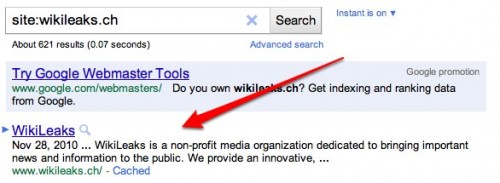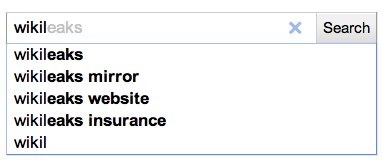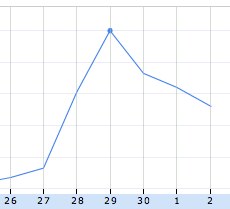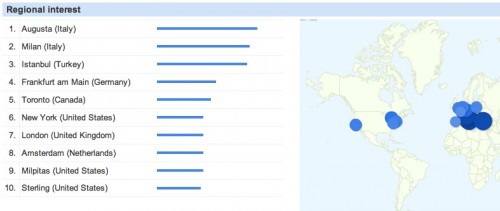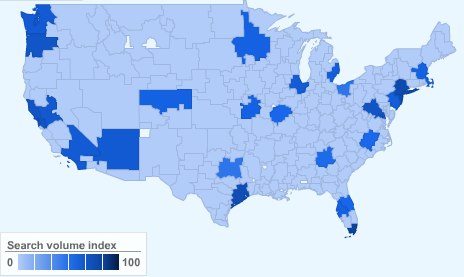Google, Bing & Searching For The New Wikileaks Website
Looking for the Wikileaks website? Having lost one domain, and having its second site going down temporarily, it’s a challenge, even for the search engines. Where’s Wikileaks? Yesterday, I wrote about how Google was still listing the old address for Wikileaks — wikileaks.org — in a search for wikileaks: That’s still the case today. Anyone […]
Looking for the Wikileaks website? Having lost one domain, and having its second site going down temporarily, it’s a challenge, even for the search engines.
Where’s Wikileaks?
Yesterday, I wrote about how Google was still listing the old address for Wikileaks — wikileaks.org — in a search for wikileaks:

That’s still the case today. Anyone clicking on that link gets nothing. The site no longer works at that address.
However, you can now find Wikileaks in the top results. You just have to look further down and know what to look for:
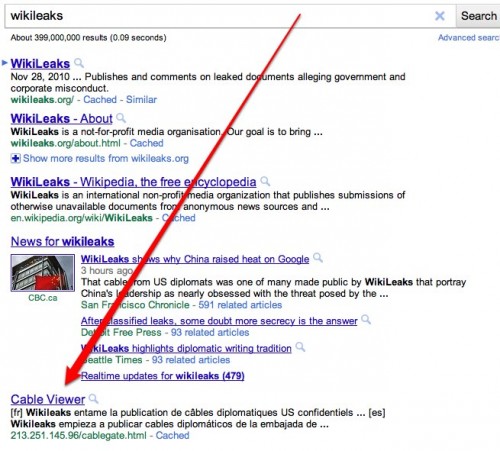
That “Cable Viewer” listing, with a description written in French and the strange number rather than a domain name? That’s Wikileaks — not the home page, but at least a key section of the site that’s in the news right now.
Note: When I originally wrote this story, I missed that Wikileaks was listed at all at its new location. About two hours later, I noticed my mistake. I’ve since adjusted the headline of this article, which was, “Why You Can’t Yet Find The New Wikileaks Site On Google.” I added the screenshot above and made a few changes to explain the difference between its new domain name and that number that’s showing up. Read on….
Wikileaks: By Number & Name
In contrast, Bing does have the new Wikileaks home page listed and has had it since yesterday. It appears at the top of the results, in response to a search for wikileaks:
Notice the domain name: Wikileaks.ch. This is a new domain name for the site, one that’s based out of Switzerland (the new site has already suffered its own temporary outage, though that now seems fixed).
Why’s Bing listing a domain name while Google’s using a string of numbers? Those numbers, 213.251.145.96, are the IP address of the Wikileaks web site.
Normally, the internet works to translate domain names behind the scenes into IP addresses, which are like telephone numbers for individual web sites. Normally, you never see these numbers. But if you know a web site’s IP address, you can enter those numbers to go to it directly. That’s helpful if for some reason, the domain name isn’t working.
When Wikileaks had its original domain closed, people started linking to its IP address. People also started linking to its new domain name. Google’s giving preference to the IP address; Bing, to the domain name.
Why Google Still Lists The Old Location
Why didn’t Google have the new domain name listed? Why’s the old name still at the top of the results?
I asked the company yesterday and was told that when sites go down, as is the case with wikileaks.org, they’re not immediately removed from Google’s listings. In addition, I was told it can take up to 24 hours until a site’s new location may appear.
Google does know that the new location exists at wikileaks.ch and includes it in its “index” or collection of documents that it searches against. You can find it, if you know how to search for it using its domain name:
However, since the old site doesn’t “redirect” or point to the new location, it makes it harder for Google to figure out that wikileaks.ch is the new official address. Wikileaks itself can’t do that pointing, because it no longer has control over the old domain.
As people across the web link to the new location, the popularity of that location will grow, which will help Google eventually get it ranking for “wikileaks.”
How’s Bing Getting It Right?
Still, Bing is listing the correct location. How did that happen? Could it be that Bing did a hand-edit?
Both Google and Bing rely on computer algorithms, or “recipes” if you will, that automatically figure out how to decide what to list first in their results. Google is religious about how it will never hand-edit a result. Did Bing do this?
A contact over at Bing tells me he’d be “surprised” if that was the case but that he’s checking on this.
On the second question, we haven’t had any communication from the US government on this. Beyond that, nothing to say on that one.
Postscript: Bing has now confirmed with me that “we did inject the new IP as we saw the breaking news about the change,” which I take to mean that it internally redirected any ranking credit for wikileaks.org to the wikileaks.ch site. Bing also told me it expected that even without human intervention, its algorithm would have made the change automatically between “a few seconds to a few hours with varying levels of confidence.” Rather than wait for that to happen, Bing went ahead with a human change.
Bing also said that it has received no blockage requests from the US government.
Many Searching For Wikileaks
If so, that’s not a negative. People are specifically searching for the site. It’s one of the suggested terms that Google prompts searchers with, as you can see below. That means it’s a popular search topic:
As you can see, people are seeking “wikileaks website” as well as “wikileaks mirror” — a reference to copies of the Wikileaks site they can visit if the main location isn’t working. A number of these mirror sites are listed here.
Google Insights is a tool that Google provides that allows you to gauge the popularity of searches. As you can see, over the past few days, Wikileaks has had a major spike in web search activity worldwide, according to the tool:
Again, among the top topics people are interested in is the actual site itself. You can see it in both the “Top Searches” overall as well as a top “Rising” search over the past seven days:
What Countries & Cities Are Especially Interested?
Google Insights also has some interesting data on the locations for all those searches. Which countries show the most interest in the topic? Albania, followed by Kenya, Pakistan, Azerbaijan, Lebanon, Sri Lanki, Bolivia, Algeria, the Dominican Republic and Italy:
This does NOT mean that most searches come from these countries. Google adjusts this chart so that it is showing countries with abnormally high interest in a topic compared to searches from that country in general. Otherwise, big countries with large populations would always dominate the interest charts.
Viewing the data worldwide, but by cities, a different picture emerges:
Now cities in Italy (Augusta & Milan) lead the list of expressing unusual interest, followed by Istanbul, Frankfurt am Main, Toronto, New York, London, Amsterdam, and Milpitas and Sterling, in the United States. Sterling in is Virginia, not that far from CIA headquarters in Langley, Virginia. Ah ha! Then again, AOL is based out of Sterling, so this might be search traffic from AOL subscribers (yes, it still has some) that’s being routed through there.
Narrowing to searches just within the United States, you can see interest at the state level (which includes Washington DC):
Rhode Island leads the list, followed by Washington DC, New York, Massachusetts, New Hampshire, Delaware, California, Connecticut, New Jersey and Maryland.
Finally, here’s the list of major metropolitan areas over the past seven days showing unusually high interest:
Miami leads the list, followed by New York, Houston, San Francisco, Washington DC, Portland, Sacramento, San Diego, Phoenix and Chicago.
The map below also shows interest by metro area across the entire continental United States:
You can explore the charts above directly yourself to view information for other countries or time ranges here.
Could US Pressure To Block Wikileaks Come?
Two major American companies — Amazon and eBay-owned PayPal — are no longer providing services to Wikileaks, in reaction to unofficial pressure by some within the US government. Senator Joe Lieberman is especially vocal on this front. Might Google and Bing, both American-based companies, come under similar pressure?
I’ve asked both if they’ve received any official requests from the US government or any US government officials to block the site. I haven’t heard back yet.
Potentially, the US government might try filing a what’s known as a DMCA complaint to claim that the leaked cables are being posted in violation of the US government’s copyright over them. That would lead to a near immediate removal of the site — or any mirror sites that complaints might be filed against. Complaints could also be filed against news organizations that reprint the entire cables, as some have done, such as The Guardian. Articles that quote parts of the cables would probably be safe.
To get back in, someone would have to file a counter-claim on behalf of the sites, which includes an agreement to appear in a US court, if necessary, to defend against the claim.
I have no idea if the US government could claim copyright over the cables, of course. That gets well outside my area. In addition, even if the US government did, the search engines could potentially reject the claims. That would leave them directly liable in a copyright lawsuit, should the US government decide to go that route.
Blocking Might Be Impossible
Of course, any of this would be trying to put the proverbial genie back in the bottle. The documents are littered across the web. It would be a full-time task to try and track each instance of them in Google or Bing and file a request.
Also see Searching The Wikileaks Cablegate Archives With Cablesearch, my article from yesterday, which covers more about Wikileaks having to move its site, as well as ways to search and read through the material.
Contributing authors are invited to create content for Search Engine Land and are chosen for their expertise and contribution to the search community. Our contributors work under the oversight of the editorial staff and contributions are checked for quality and relevance to our readers. The opinions they express are their own.
Related stories

